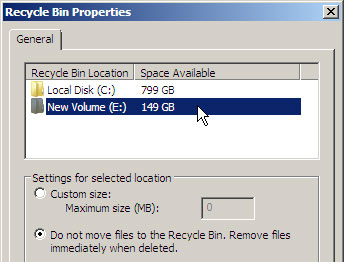
 Yes, I have read it in the past but it was worth a second read.
Yes, I have read it in the past but it was worth a second read. I can't disagree with most of what you are saying but I was a little miffed
at the implication that just because one chooses to use C++, the resulting
software is something to be avoided and feared.
I am also very concerned about my customers and fellow developers. I have
been successful with C++, others may not be so fortunate.
Founded in 2002 in Auckland, New Zealand, Cristalink Limited specializes in application and device driver development for Microsoft Windows. For additional information and free evaluation copies of all Cristalink products, visit Cristalink's website at.
Hi all, How can we configure a Virtual Tape Library (VTL) which is a software/appliance that can simulate the tape library with DPM 2012 R2 so that we have long-term backup? Tandberg tape drive free download - IBM ULTRIUM-HH4 TAPE DRIVE, IBM AS/400 Tape Drive, Quantum DLT tape drive, and many more programs.
Cristalink Driver Ed
Regards,

Mike
'Don Burn' wrote:
Cristalink Driver Salary
> First is you have not read
> http://www.microsoft.com/whdc/driver/kernel/KMcode.mspx read it. Second, as
> I said in an earlier post, there are people who carefully craft drivers in
> C++ for the kernel. One of the careful things is never use STL, even the
> most rabid C++ types I know would never use this in a kernel driver.
>
> I don't use C++ for a lot of reasons:
>
> 1. Kernel driver programming is hard. Bottom line you have a lot
> things to get right, so why add another problem to a already complex task.
>
> 2. C is the standard. I try to think of my customer whether I consult
> or an an employee. One of the things you have to consider is the next
> person who gets your driver. Are they going to know C++ as well as you do
> (and if you don't know it well you shouldn't use it), are they going to be
> able to easily understand you classes. One thing going for driver
> development is that drivers enforce a lot of structure on your code, hiding
> things in C++ can obscure that structure.
>
> 3. C++ can do a lot of things behind your back. See the paper for
> some examples, but bottom line is C++ can grab stack, create initializers in
> unexpected places and in general surprise you. Note: that some Microsoft
> teams that use C++ in the kernel, do assembler code reviews to be sure
> things are right.
>
> I like C++ for a lot of things. I have used the language for over 20 years.
> I have supported compilers for the language and written code generators for
> the language. Finally, I was on the C++ standards committee for a while.
>
> But while I like C++, I take the minimal C++ approach that many Bell Lab's
> people did in the early days of the language. I.E. use it for clean simple
> encapsulations and small classes. Even with this approach, I would never
> use the language in the kernel.
>
>
> --
> Don Burn (MVP, Windows DDK)
> Windows 2k/XP/2k3 Filesystem and Driver Consulting
> Remove StopSpam from the email to reply
>
>
>
> 'Mike Yoke' <Mike...@discussions.microsoft.com> wrote in message
> news:3B116FA8-ACEA-44E7-AE0C-E233842228D5@microsoft.com...
> >I haven't experienced any stablity problems with my drivers. I use
> > DriverVerifier religiously and all of our drivers go through formal
> > functional and system test procedures before being released to our
> > customers.
> > Why does writing in C++ automatically imply shoddy quality?
> >
> > Mike
> >
> > 'Don Burn' wrote:
> >
> >> Please let us know the companies and drivers you have written for, so we
> >> can
> >> avoid them. A friend of mne just had to deliver the bad news to a firm
> >> that
> >> if they wanted a stable maintainable driver, they had to throw out the
> >> crap
> >> they had, which did exactly as you describe. Having heard about this
> >> one,
> >> and encountered a few like it myself, I know how the customer feels when
> >> you
> >> explain, gee throw out this plague.
> >>
>
>
>
